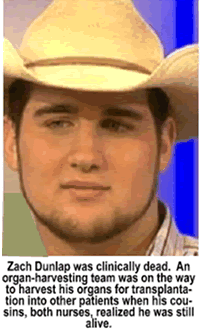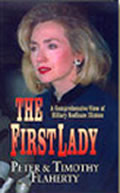ROBBING YOU BLIND ALIVE AND DEAD
By
Jon Christian Ryter
July 7, 2010
NewsWithViews.com
Nationwide 38% of all drivers are registered organ donors. According to Donate Life America there are 86.3 million registered organ donors listed in State donor registries. Most recipients of organs become registered donors. It is unclear how many of the names within the State registries are duplicates. Most people, according to a New York Times article, don't sign up for organ donations for a variety of reasons. In some cases, they feel they may need them in the afterlife. In some cases they fear if they are in an accident and some "important" person needs an organ and they are a "match," the hospital will let them die so the VIP gets the organ they need to keep them alive. An online survey sponsored by Donate Life America, an organ donor advocacy group, taken by 5,100 people gave these results:
The survey revealed that the reluctance of 57% of the respondents was due to the unanswered question in their mind if brain dead people can be restored to life. Fifty percent of those surveyed were convinced that doctors would not try as hard to save them if they were organ donors. Forty-four percent believed that most people buy organs on the black market and for that reason, there is no need for them to become organ donors; and finally, 23% believe they are either too old or not healthy enough to donate organs. In part, there is some truth to the thinking of this group. The organs of many people with catastrophic diseases will not be considered viable donor organs. However, family members or friends whose organs are not viewed as "desirable," can still donate organs to recipients with diseases or illnesses that keep them off the donor recipient lists. In other words, every beating heart or workable kidney or liver is better than a damaged or diseased heart, kidney or liver in the body of a person on life support with the clock ticking down to the moment of their death.
For the benefit of those who believe they will need their organs in the afterlife, it is important to understand that at the moment of death two things happen. First, we physically leave this tent of flesh we called "us" for our entire life. It is not "us." That flesh tent, and all the parts that made it function, are simply the temporary abode in which we dwelt during our sojourn on Earth. (1 Cor; 15:42-44; 2 Cor. 5:1-8; 2 Pe. 1:13-15). Many Christians believe when they are "reunited with their bodies at the last trump, they will need all of the body parts they had during life, and thus, are reluctant to donate to someone else body parts they might need later. The soul that resided within that flesh tent and controlled the thought processes and motor functions of that human apparatus was the person. At the moment of death, when the blood within those bodies begins to coagulate, the flesh dies and begins to rot. The soul, which is the real person, passes into the afterlife, destined to Heaven or Hell based on the tenets they practiced in life. They are not reincarnated. Scripture tells us we come this way once and thus, suffer death once (Heb. 9:27). Ultimately, the flesh disintegrates and the bones themselves will dry out (Ezek. 37:1-10). At that point, there is no heart, no liver, no kidneys, no eyes or ear drums, or any other organ you might have donated in life. Left interned long enough, our flesh returns to the soil which, eons ago, God breathed life into and called it "man."
The only problematic question in this equation is: at what point is "brain dead" dead? The clinical description of brain dead is at the point where there is no clinical evidence of brain function. In rare instances brain dead people still have a heartbeat not orchestrated by a ventilator. But usually when brain activity ceases, the heart will stop beating and with no blood flow to the brain, the clinically dead person is irreversibly dead. The Uniform Determination of Death Act of 1980 was proposed by the American Bar Association after the death of Karen Ann Quinlan, and rejects the brain dead approach in favor of irreversible brain stem dysfunction as an indicator of death. The draft legislation, pushed by the Clinton Administration as a redefinition of being legally dead, was never enacted by Congress. Kansas was the first state to adopt the criteria as Statute 77-202, defining death as having occurred when "...an individual has sustained either (1) irreversible cessation of circulatory and respiratory function, or (2) irreversible cessation of all functions of the entire brain, including the brain stem, is dead." Most States, and most nations, define death as the "...complete, irreversible cessation of all brain function, including brain stem function..." What the ABA wanted to achieve with the Uniform Determination of Death Act of 1980 was to base clinical death solely on brain stem activity, which means people like Teri Schiavo who lacked brain stem activity, but whose brain was still active, would be considered legally dead and, without the fanfare that accompanied the legal execution of Schiavo, could be put to death to accommodate her husband, Michael Schiavo who wanted to marry another woman but, according to Florida law, could not divorce his wife because she was not capable of defending herself in court.
Then
there is the case of Frederick, Oklahoma resident Zach Dunlap, a 21-year
old who died in an ATV accident a week before Thanksgiving on Nov. 17,
2007. When he was taken to  the
emergency room, he had brain matter leaking from his ears. He was airlifted
to a trauma center in Wichita Falls, Texas. Thirty-six hours after the
accident a PETscan revealed no brain function. Doctors told his parents,
Pam and Doug Dunlap, that their son was clinically dead. There was no
blood flowing to his brain. Zach's organs were prime for transplant.
The trauma center was keeping his body alive on a ventilator because
he carried an organ donor card. Zach's parents agreed to let an organ-harvest
team take their son's organs to save as many others as they could. As
the organ-harvest team flew to Wichita Falls by helicopter, Pam, Doug,
Zach's sister, Kacy and his grandmother Naomi said their goodbyes. As
the nurse prepared Zach for the harvest-team by removing the tubes from
Zach's throat, two of Zach's cousins, Dan and Christy Coffin, both nurses,
saw something that told them Zach was not dead. On a hunch, Dan Coffin
ran the blade of his pocket knife up the sole of one of Zach's feet.
The foot yanked away. Zach was alive. Within 5 days he opened his eyes
and began to talk. In 48 days he walked out of the rehab center. He
was less than 48 minutes from having all of the organs in his body harvested.
the
emergency room, he had brain matter leaking from his ears. He was airlifted
to a trauma center in Wichita Falls, Texas. Thirty-six hours after the
accident a PETscan revealed no brain function. Doctors told his parents,
Pam and Doug Dunlap, that their son was clinically dead. There was no
blood flowing to his brain. Zach's organs were prime for transplant.
The trauma center was keeping his body alive on a ventilator because
he carried an organ donor card. Zach's parents agreed to let an organ-harvest
team take their son's organs to save as many others as they could. As
the organ-harvest team flew to Wichita Falls by helicopter, Pam, Doug,
Zach's sister, Kacy and his grandmother Naomi said their goodbyes. As
the nurse prepared Zach for the harvest-team by removing the tubes from
Zach's throat, two of Zach's cousins, Dan and Christy Coffin, both nurses,
saw something that told them Zach was not dead. On a hunch, Dan Coffin
ran the blade of his pocket knife up the sole of one of Zach's feet.
The foot yanked away. Zach was alive. Within 5 days he opened his eyes
and began to talk. In 48 days he walked out of the rehab center. He
was less than 48 minutes from having all of the organs in his body harvested.
That is the fear of the 57% of the people who refuse to sign donor cards. Just because a doctor says you're clinically dead does not mean you're clinically dead. The AMA criteria for determining when death occurs said Dunlap was dead. At that point, the hospital can legally extract body parts from the organ donor. Zach Dunlap and others like them who are viewed as brain dead when they merely suffered a trauma which made it appear they were brain dead, would die when their organs were harvested. Had the organ-harvest team cracked Zach Dunlap open and began removing his organs, they would have killed a living person who died feeling the pain of being butchered like livestock. I guess that's why I never signed an organ donor card, and won't.
And that's precisely why I was appalled when I picked up a copy of USA Today yesterday and read the 3A heading: Organ donation: An opt-out policy? NY lawmaker is pushing for a system in which consent is presumed. The New York Assemblyman and social progressive, Richard Brodsky, is also a candidate for Attorney General of the State of New York. A warning to all New Yorkers—even those who carry the organ donor heart on their drivers' license. It's bad enough when the politicians steal your money. This one wants to reach inside your chest and steal your organs. I wonder if his campaign manager is Dr. Jack Kervorkian?
Like most social progressives, Brodsky, who claims to be a champion of the people (and what social progressive does not?) decided that organ donation should be assumed. Anyone who does not want to be an organ donor should be required to apply for an exemption from organ donation when they renew their drivers' license. In the meantime, if they die before their driver's licenses expire, they will become organ donors whether they want to or not.
Brodsky's daughter, Julianne Wille-Brodsky has had two kidney transplants. Her last one was four years ago. She is now an advocate for mandating that all people become organ donors. I guess if she needs a third transplant, she wants to make sure there's a kidney available. Brodsky and NY State Senator Thomas Duane sponsored the legislation in New York that would "presume consent" that the individual has agreed to become an organ donor should something happen to him (or her). This is typical social progressive thinking. Brodsky told USA Today his proposal would require the names of all New York residents to automatically be added to the State donor registry. To get off of it, the New York resident, whether he or she had a drivers' license or not, must apply for an exemption.
According to the Gannett-owned USA Today in an April, 2010 survey conducted by the New York Alliance for Donation found that 67% of New York's residents supported organ donation (most of them, based on the fact that only 13% of the State's residents are on any donor lists, support someone other than themselves to do the organ donating. Being fair-minded social progressives, Brodsky and Duane believe that since someone told them that 67% of the people support organ donations (even though only 13% are actually organ donors), its only fair to mandate that everyone participate so, for those who need them, there are enough organs to go around. Brodsky and Duane are smart enough to do the math particularly since they've seen the Donate Life America National donor statistics and the numbers don't add up the same way the rhetoric does.
The Donate Life America survey indicates that there have been 82.000 organ transplants since 2007 and approximately 120,000 cornea transplants and millions of skin tissue transplants that came through the State donor registries. The website claims there are 83 million organ donors registered who apparently don't die fast enough since there are 106,000 men, women and children on a transplant waiting list, with about 18 people dying each day because they could not get the organ they needed (or one that matched) in time to save their life.
According to the organ donor registries, to meet the demand, they must have 100 million donor designations in the State registries. Only 50% of them will come from the Departments of Motor Vehicles [DMC] across the nation before they will have enough organ donors to save the lives of those awaiting transplants.
Legislation similar to the New York bill is languishing in the Illinois State Senate. Lisa Sims, a spokesperson for Sen. Dale Risinger [R-Peoria] who sponsored the bill, said he hopes to get it out on the floor for a vote by January. A mandatory organ donor bill died in the Pennsylvania State legislature in 1993. That bill was being driven by the American Legislative Exchange Council [ALEC], a conservative think tank headquartered in Washington, DC. which shows that it's not just social progressives who think they have a right to invade the bodies of the dead regardless of the wishes of that individual before they die, or their families at the moment the pass on. George Orwell's nonpartisan Big Brother has arrived and he believes he owns us while we are alive and after we die.
A presumed-consent bill did not get out of committee in Texas in 2003. The same fate came to a Delaware presumed-consent bill in 2008. Clearly there is a need for hundreds of thousands more organ donors. Thousands of people who would otherwise be able to live productive lives die needlessly over a lack of viable organs. Contrary to the view of the donor organizations and doctors who claim there are no rushes to judgment on harvesting organs, rushes to judgment take place too often if only once.
Had Zach Dunlap's cousin not come to say goodbye and saw signs that indicated to him that his cousin was still alive (when the doctor and the Petscan said he was dead), Zach would have become the real life sequel to the Texas Chainsaw Massacre. Several people—some of whom likely died without them—would have benefited from Zach Dunlap's healthy organs. Had the organ-harvesters reached Zach Dunlap before his cousin, I doubt we would have had a made-for-TV last minute Dr. Gregory House "save." Dunlap, whose nerves were working fine, would have suffered a horrible, excruciating painful death because a doctor made a wrong call and declared him to be clinically dead. I wonder how well that doctor slept that night? I know Dan Coffin slept well. But, when you ask the question why more people don't become organ donors, Zach Dunlap's the reason.
| Subscribe to the NewsWithViews Daily News Alerts! |
Contrary to what the organ donor registries say, or what the medical community says, or what the organ harvesters say, there is a tremendous rush to judgment. Fix the problem so there are no more Zach Dunlaps, and more organ donors will step forward. And, for God's sake, fire the idiots who are trying to enact mandatory presumed-consent organ donor laws. These are lords of the fiefdoms who aren't content with robbing you blind while you're alive, they want to steal your corneas after you're dead.













 Share This Article
Share This Article






